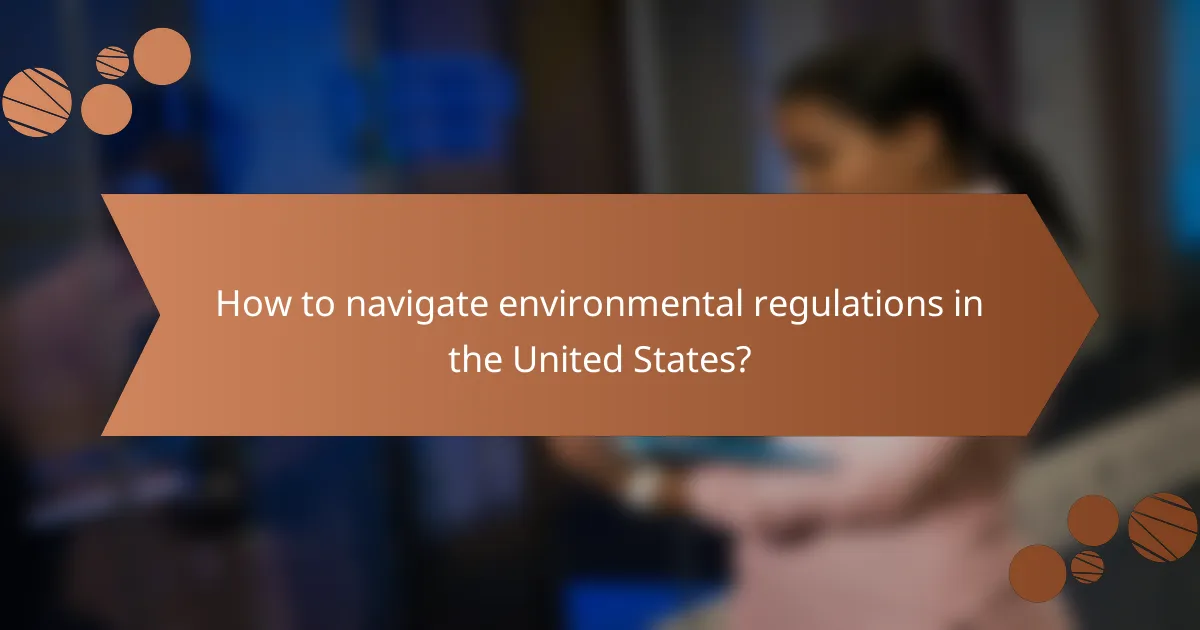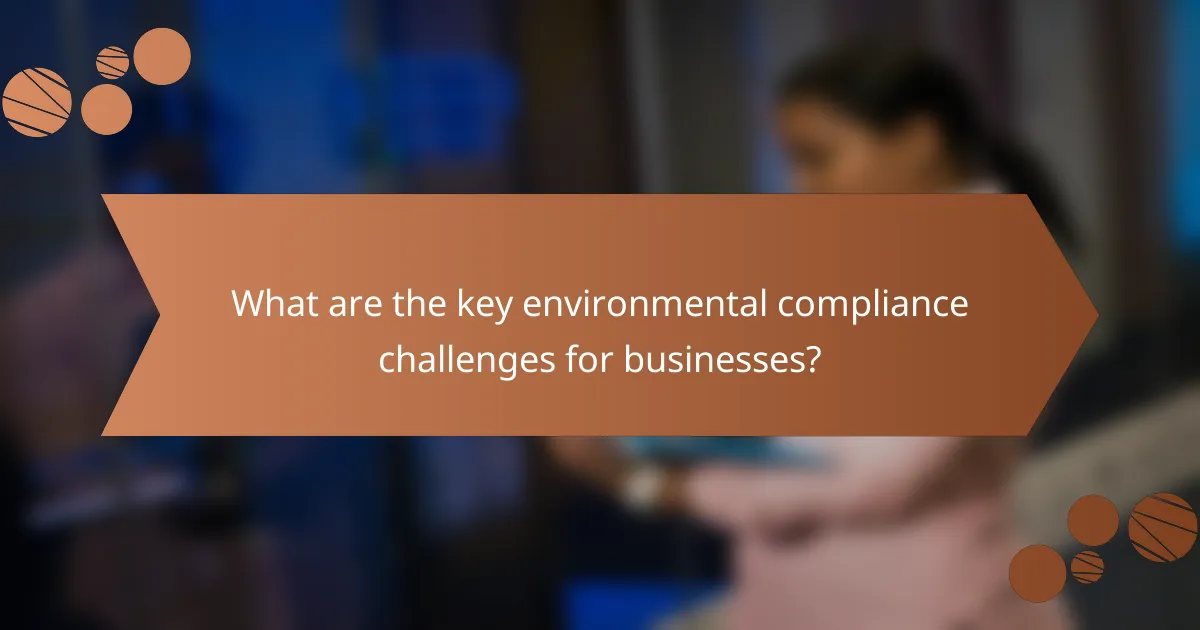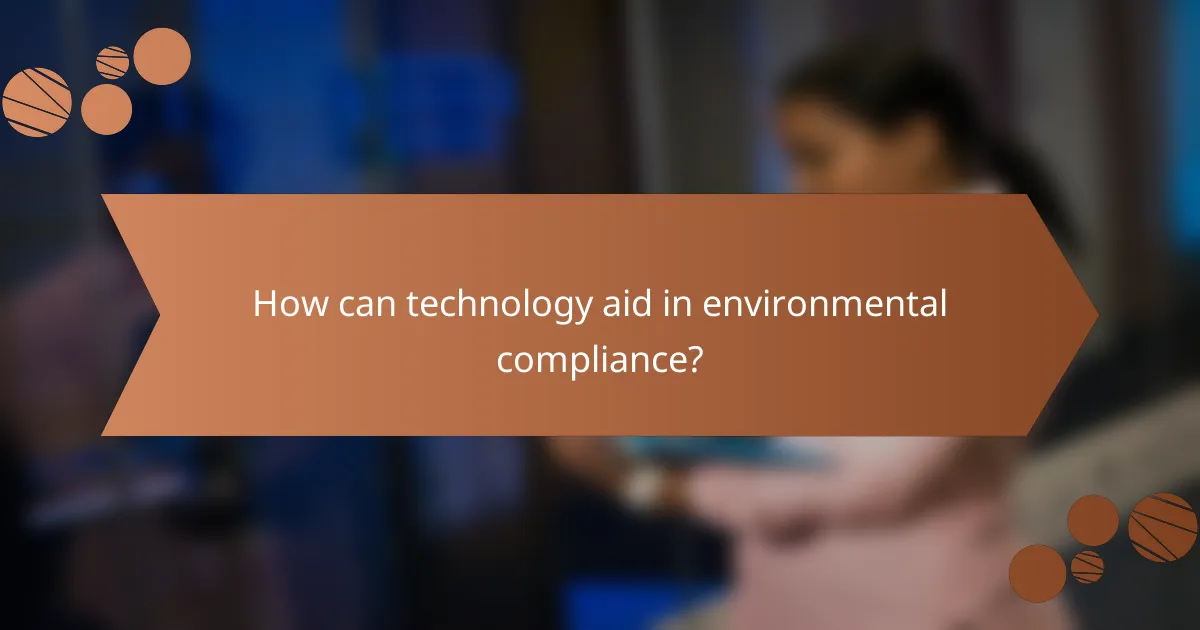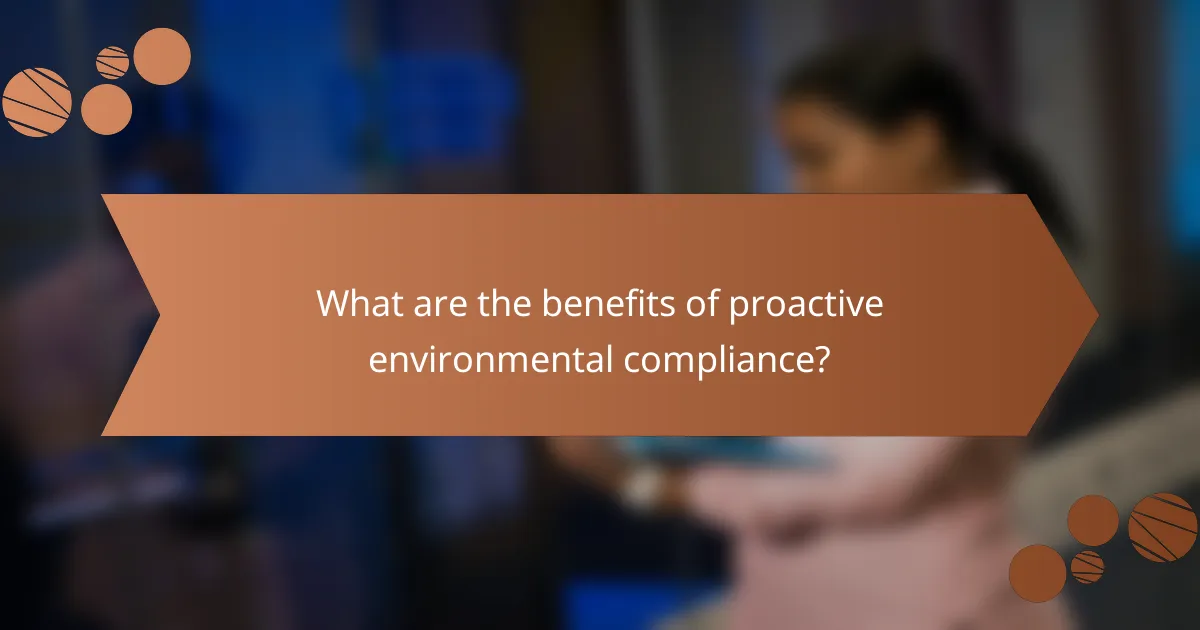As companies expand, ensuring environmental compliance becomes essential for sustainable growth. By implementing best practices such as sustainability audits and engaging with local agencies, businesses can navigate complex regulations effectively. Understanding federal and state-specific environmental laws is crucial to avoid penalties and enhance corporate reputation.

What are the best practices for environmental compliance in corporate expansion?
Best practices for environmental compliance during corporate expansion involve proactive measures that ensure adherence to regulations while promoting sustainability. Key strategies include conducting sustainability audits, engaging with local agencies, training employees, utilizing eco-friendly technologies, and regularly updating compliance protocols.
Implementing sustainability audits
Sustainability audits are essential for identifying environmental impacts and compliance gaps in corporate operations. These audits should assess energy use, waste management, and resource consumption, providing a clear picture of current practices and areas for improvement.
Consider conducting audits annually or biannually, depending on the scale of operations. Engaging third-party auditors can enhance credibility and provide expert insights into best practices and regulatory requirements.
Engaging with local environmental agencies
Building relationships with local environmental agencies is crucial for staying informed about regulations and compliance expectations. These agencies can offer guidance on local environmental laws, permitting processes, and community engagement strategies.
Regular communication with these agencies can facilitate smoother expansion processes and help address potential compliance issues before they escalate. Attend local workshops or forums to stay connected and informed.
Training employees on compliance
Employee training is vital for ensuring that all staff understand environmental compliance requirements and best practices. Regular training sessions should cover relevant regulations, company policies, and the importance of sustainability in daily operations.
Consider implementing a certification program for employees involved in environmental management. This not only enhances knowledge but also fosters a culture of accountability and commitment to sustainability within the organization.
Utilizing eco-friendly technologies
Incorporating eco-friendly technologies can significantly reduce environmental impacts during corporate expansion. Options include energy-efficient systems, renewable energy sources, and waste reduction technologies that align with sustainability goals.
Evaluate the return on investment for these technologies, as initial costs may be offset by long-term savings in energy and resource use. Research local incentives or grants that may support the adoption of green technologies.
Regularly updating compliance protocols
Compliance protocols should be dynamic, reflecting changes in regulations and industry standards. Regular reviews and updates ensure that the company remains compliant and can adapt to new environmental challenges.
Establish a schedule for reviewing compliance protocols, ideally every six months, and involve cross-departmental teams to gather diverse insights. This proactive approach helps mitigate risks and enhances overall corporate responsibility.

How to navigate environmental regulations in the United States?
Navigating environmental regulations in the United States requires understanding federal laws and state-specific requirements. Companies must ensure compliance with various acts that govern air, water, and waste management to avoid penalties and promote sustainability.
Understanding the Clean Air Act
The Clean Air Act (CAA) is a comprehensive federal law that regulates air emissions from stationary and mobile sources. It sets national standards for air quality to protect public health and the environment.
Businesses must obtain permits for emissions and adhere to specific limits set by the Environmental Protection Agency (EPA). Regular monitoring and reporting are essential to demonstrate compliance and avoid fines.
Consider implementing pollution control technologies and practices to reduce emissions effectively. Staying updated on state-specific regulations is crucial, as some states may have stricter standards than federal requirements.
Navigating the Clean Water Act
The Clean Water Act (CWA) aims to restore and maintain the integrity of the nation’s waters by regulating discharges of pollutants. Companies discharging wastewater must obtain a National Pollutant Discharge Elimination System (NPDES) permit.
When applying for a permit, businesses should conduct thorough assessments of their wastewater treatment processes. Regular testing and reporting are necessary to ensure compliance with permit conditions.
Investing in effective wastewater treatment systems can help meet regulatory standards and minimize environmental impact. Understanding local water quality standards is also vital, as they may vary significantly across states.
Complying with the Resource Conservation and Recovery Act
The Resource Conservation and Recovery Act (RCRA) governs the management of hazardous and non-hazardous waste. It establishes a framework for waste treatment, storage, and disposal to protect human health and the environment.
Businesses generating hazardous waste must identify, classify, and manage it according to RCRA regulations. This includes obtaining proper permits and maintaining accurate records of waste generation and disposal.
Regular training for employees on waste management practices is essential to ensure compliance. Additionally, consider implementing waste reduction strategies to minimize the volume of waste generated, which can lead to cost savings and reduced regulatory burden.

What are the key environmental compliance challenges for businesses?
Businesses face several key environmental compliance challenges, including keeping up with regulations, managing waste disposal, and addressing community concerns. Navigating these issues is crucial for maintaining legal compliance and fostering a positive corporate image.
Staying updated with changing regulations
Regulatory landscapes can shift frequently, making it essential for businesses to stay informed about environmental laws. Companies should regularly review local, national, and international regulations that apply to their operations, as non-compliance can lead to significant fines and reputational damage.
To effectively monitor changes, businesses can subscribe to industry newsletters, attend relevant conferences, or engage with legal experts specializing in environmental law. Implementing a compliance management system can also streamline the process of tracking regulatory updates.
Managing waste disposal effectively
Effective waste disposal is a critical compliance challenge that requires businesses to understand local waste management regulations. Companies must categorize waste correctly, ensuring hazardous materials are disposed of according to strict guidelines to avoid legal repercussions.
Establishing a waste management plan can help streamline disposal processes. This plan should include waste reduction strategies, recycling initiatives, and partnerships with certified waste disposal companies. Regular audits of waste management practices can also identify areas for improvement.
Addressing community concerns
Community concerns about environmental impacts can pose challenges for businesses, particularly in industries with significant ecological footprints. Engaging with local stakeholders through public meetings and feedback sessions can help address these concerns proactively.
Transparency is key; businesses should communicate their environmental practices and improvements openly. Developing community outreach programs that demonstrate commitment to sustainability can enhance public perception and foster goodwill.

How can technology aid in environmental compliance?
Technology plays a crucial role in enhancing environmental compliance by streamlining processes, improving monitoring capabilities, and facilitating accurate reporting. By leveraging various technological tools, organizations can ensure adherence to regulations while minimizing their environmental impact.
Using compliance management software
Compliance management software helps organizations track and manage their environmental obligations efficiently. These platforms often include features for document management, task tracking, and audit trails, which simplify the compliance process.
When selecting compliance management software, consider factors such as user-friendliness, integration capabilities with existing systems, and support for relevant regulations. Popular options include tools that cater specifically to industries like manufacturing or energy, which may have unique compliance requirements.
Implementing IoT for real-time monitoring
Internet of Things (IoT) devices enable real-time monitoring of environmental parameters such as air quality, water usage, and waste management. By deploying sensors and connected devices, organizations can gather data continuously, allowing for immediate responses to potential compliance issues.
For effective implementation, choose IoT solutions that offer reliable data transmission and robust security features. Additionally, ensure that the collected data can be easily integrated into compliance reporting systems to streamline workflows.
Leveraging data analytics for reporting
Data analytics tools can transform raw environmental data into actionable insights, aiding in compliance reporting and decision-making. By analyzing trends and patterns, organizations can identify areas for improvement and ensure they meet regulatory requirements.
To maximize the benefits of data analytics, focus on tools that provide visualization capabilities and customizable reporting options. This allows for clearer communication of compliance status to stakeholders and can enhance transparency with regulatory bodies.

What role do environmental consultants play in corporate expansion?
Environmental consultants are essential in corporate expansion as they help businesses navigate environmental regulations and compliance issues. They assess potential environmental impacts and provide strategic advice to ensure sustainable growth while minimizing legal risks.
Conducting risk assessments
Environmental consultants conduct risk assessments to identify potential environmental hazards associated with corporate expansion projects. This process involves evaluating the site for contamination, assessing ecological impacts, and analyzing compliance with local regulations.
For example, a consultant may perform soil and water testing to determine if a site is suitable for development. They often use standardized methodologies to quantify risks, helping companies prioritize mitigation strategies effectively.
Providing regulatory guidance
Consultants offer regulatory guidance by interpreting complex environmental laws and standards relevant to corporate expansion. They ensure that businesses understand their obligations under local, national, and international regulations, such as the Clean Air Act or the European Union’s Environmental Impact Assessment Directive.
By staying updated on regulatory changes, environmental consultants help companies avoid costly fines and delays. They can also assist in preparing necessary documentation for permits, ensuring compliance throughout the project lifecycle.
Facilitating stakeholder engagement
Facilitating stakeholder engagement is a critical role of environmental consultants during corporate expansion. They help businesses communicate effectively with local communities, government agencies, and other stakeholders to address environmental concerns and gather feedback.
Consultants often organize public meetings or workshops to present project plans and gather input. This proactive approach not only builds trust but also helps identify potential issues early, allowing for smoother project implementation and community support.

What are the benefits of proactive environmental compliance?
Proactive environmental compliance helps businesses avoid legal penalties, enhance their reputation, and improve operational efficiency. By adhering to regulations before issues arise, companies can foster sustainable practices that benefit both the environment and their bottom line.
Cost Savings
Implementing proactive environmental compliance can lead to significant cost savings. Companies that invest in sustainable practices often reduce waste and energy consumption, which lowers operational costs. For example, switching to energy-efficient systems can decrease utility bills by 20-30% over time.
Additionally, avoiding fines and legal fees associated with non-compliance can save businesses thousands of dollars. Regular audits and assessments can identify potential compliance issues before they escalate, further protecting financial resources.
Enhanced Reputation
A strong commitment to environmental compliance enhances a company’s reputation among consumers and stakeholders. Businesses that prioritize sustainability are often viewed more favorably, leading to increased customer loyalty and potentially higher sales. In fact, studies show that a significant portion of consumers prefer brands that demonstrate environmental responsibility.
Moreover, positive public relations stemming from compliance efforts can attract investors and partners who prioritize sustainability in their business dealings. This can open up new opportunities for collaboration and growth.
Risk Management
Proactive environmental compliance serves as a vital risk management tool. By identifying and addressing potential environmental impacts early, companies can mitigate risks associated with regulatory changes and public backlash. This foresight helps avoid disruptions to operations and maintains business continuity.
Establishing a robust compliance framework also prepares businesses for unexpected challenges, such as changes in environmental laws or emerging sustainability trends. Companies that adapt quickly are more likely to thrive in a competitive market.
Employee Engagement
Engaging employees in proactive environmental compliance initiatives can boost morale and foster a culture of sustainability. When employees see their company taking meaningful steps toward environmental responsibility, they are more likely to feel proud of their workplace and contribute positively.
Training programs that educate staff on compliance practices can enhance their skills and awareness, leading to more innovative solutions for reducing environmental impact. Encouraging employee participation in sustainability initiatives can also lead to valuable insights and improvements in operations.



